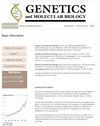美洲原住民血统人群中疾病的遗传关联。
IF 1.3
4区 生物学
Q4 BIOCHEMISTRY & MOLECULAR BIOLOGY
引用次数: 0
摘要
由于美国原住民在基因组学研究中的代表性不足,人们对影响美国原住民人群的复杂疾病的基因结构知之甚少。虽然与疾病性状变异相关的遗传多样性大部分是全球人群共有的,但其中一部分预计是包括美国原住民在内的各大陆群体所独有的。在此,我将介绍对美洲大陆土著居民以及有部分土著血统的非土著居民进行的全基因组关联研究的知识现状,重点是疾病易感性和人体测量特征。虽然一些研究发现了土著居民特有的风险等位基因,但它们对性状变异的影响大多很小。我认为,由于关联模型中缺乏社会文化经济协变量,许多种群间研究得出的关联可能被夸大了。我鼓励在未来的 GWAS 研究中纳入混血个体,以控制环境因素的种群间差异。我认为,一些复杂疾病的出现可能是适应过去进化选择性压力的权衡代价。最后,我讨论了在 GWAS 研究中扩大原住民祖先的研究小组如何成为准确评估美洲大陆人群遗传风险的关键,从而减少全球健康差异。本文章由计算机程序翻译,如有差异,请以英文原文为准。
Genetic associations with disease in populations with Indigenous American ancestries.
The genetic architecture of complex diseases affecting populations with Indigenous American ancestries is poorly understood due to their underrepresentation in genomics studies. While most of the genetic diversity associated with disease trait variation is shared among worldwide populations, a fraction of this component is expected to be unique to each continental group, including Indigenous Americans. Here, I describe the current state of knowledge from genome-wide association studies on Indigenous populations, as well as non-Indigenous populations with partial Indigenous ancestries from the American continent, focusing on disease susceptibility and anthropometric traits. While some studies identified risk alleles unique to Indigenous populations, their effects on trait variation are mostly small. I suggest that the associations rendered by many inter-population studies are probably inflated due to the absence of socio-cultural-economic covariates in the association models. I encourage the inclusion of admixed individuals in future GWAS studies to control for inter-ancestry differences in environmental factors. I suggest that some complex diseases might have arisen as trade-off costs of adaptations to past evolutionary selective pressures. Finally, I discuss how expanding panels with Indigenous ancestries in GWAS studies is key to accurately assess genetic risk in populations from the American continent, thus decreasing global health disparities.
求助全文
通过发布文献求助,成功后即可免费获取论文全文。
去求助
来源期刊

Genetics and Molecular Biology
生物-生化与分子生物学
CiteScore
4.20
自引率
4.80%
发文量
111
审稿时长
3 months
期刊介绍:
Genetics and Molecular Biology (formerly named Revista Brasileira de Genética/Brazilian Journal of Genetics - ISSN 0100-8455) is published by the Sociedade Brasileira de Genética (Brazilian Society of Genetics).
The Journal considers contributions that present the results of original research in genetics, evolution and related scientific disciplines. Manuscripts presenting methods and applications only, without an analysis of genetic data, will not be considered.
 求助内容:
求助内容: 应助结果提醒方式:
应助结果提醒方式:


